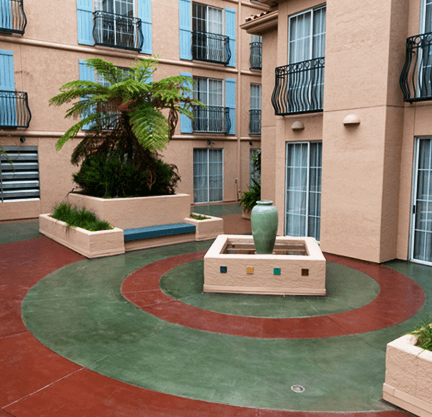
Concrete is something that many business owners don't give too much attention to! It's just a sidewalk or a parking lot; how complicated can that actually be? It's just pouring out fresh concrete, right? The answer is no! It's actually one of the most complex parts of any ADA compliant construction project! Anywhere that you install concrete around your business needs to be done in compliance with the Americans with Disabilities Act. It is crucial that you choose the right contractor to handle this type of concrete work. Otherwise, you could find yourself facing a Federal lawsuit. At Protrk Construction, all of our ADA concrete work is designed and guaranteed to be 100% ADA compliant. We will only use concrete in all areas that require a maximum of 2% cross slope. This includes handicap parking spaces, wheelchair ramps with less than an 8% directional slope, curb ramps, accessible walks, ADA compliant sloped walks with less than 5% directional slope, ADA compliant clear spaces for exterior ADA Doors, and installing only Yellow Truncated domes to ensure all our accessible routes are not just ADA compliant but also up to California code as well.
There are certain 'hotspots' when it comes to exterior concrete, where most businesses fail a CASp inspection because it is not up to the standards required by the Americans with Disabilities Act. Often this is because a contractor who is not well versed in the law has made an error. When it comes to ADA concrete, the margins for error are so small that they may as well be non-existent! These mistakes are not made maliciously by contractors; it's simply a lack of knowledge or experience. However, the end result is that business owners end up paying twice to make sure that their concrete work is fully compliant. Approximately 25% of the concrete work we undertake is redoing work that was non-compliant when it was initially installed. Please don't take the risk of having to pay twice; use an experienced ADA concrete contractor like Protrk Construction and get it right the first time. Let's take a look at some of those hotspots that may currently feature non-compliant concrete.
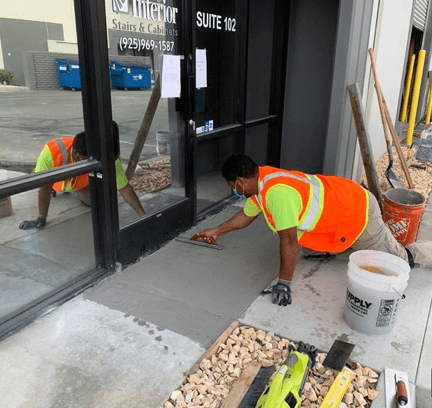
Is the path from your parking lot or the nearest mass transit stop to your business's entryway blocked by a raised sidewalk curb? If the answer is yes, you will need to consult a concrete contractor with experience in the Title III regulations of the ADA and discuss introducing curb cuts or curb ramps to make the path more accessible. This is going to allow anyone using a wheelchair, mobility scooter, or some other walking aid safer access to your property. It is important to make sure that the correct concrete is used to create these features and that they meet the cross-slope requirements.
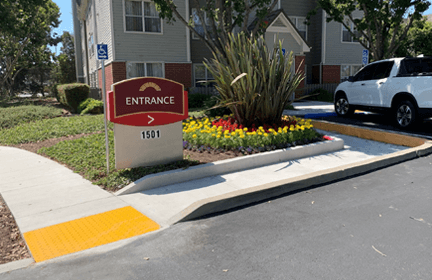
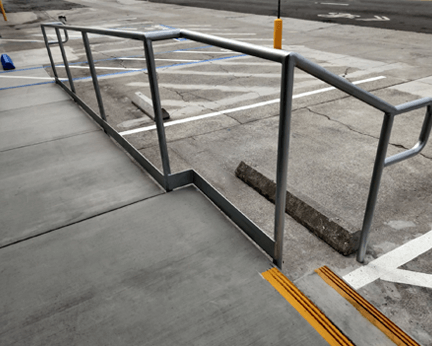
When it comes to providing access ramps for disabled people to access a business, the law does not actually state a specific material that needs to be used. It only requires that the ramp is made of slip-resistant material and that it will not allow water to pool. Concrete is an excellent choice to fulfill these conditions as it is porous, which will absorb any water rather than allow it to collect on the surface. It is also important to make sure that your concrete access ramps also have ADA compliant landings at the top and bottom. These must also adhere to specific standards, including being completely level, as wide as the access ramp, and it should be at least 60 inches long. If the ramp features a rise over six inches rise, you will also need to install handrails on both sides.
Parking lots may seem like the simplest of tasks, but it is more than just pouring concrete. There are a lot of regulations that need to be satisfied if your property is to be compliant with the 2010 ADA Standards for Accessible Design. The exact number of accessible parking stalls that are required is calculated for each property based on how many total parking spaces will be in the lot. Of the accessible parking stalls, one in every six must be van accessible. Even if you only have one or two accessible spaces, at least one must be van accessible for every property. There are also regulations when it comes to choosing which of the spaces in the parking lot will be located. They should always be situated on the shortest accessible path of travel to an accessible entrance. It doesn't just stop with the concrete, either! Accessible parking stalls also require the appropriate signage and striping to be compliant. This also needs ongoing maintenance to upkeep the paint. If it wears away or the signage is stolen or vandalized, your parking lot is non-compliant.
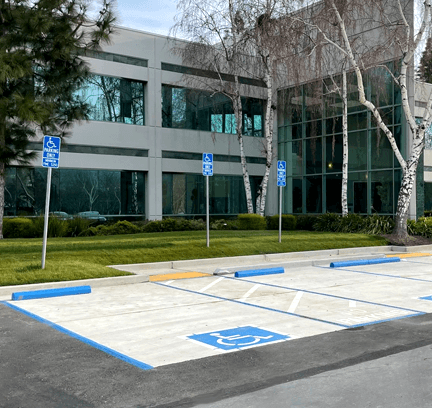
Disclaimer: Protrk® Construction does not use Asphalt for Accessible Parking Stalls, and Aisles, Accessible Routes, or anywhere a 2% maximum Cross Slope is required. This is because we have found concrete is the best product for ADA work, so we can guarantee it to stay 2% compliant.
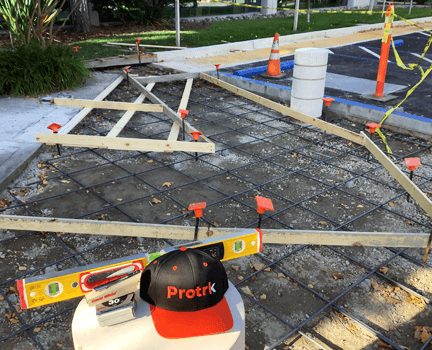
As we have already touched on, when undertaking any type of ADA construction work for your business, it is necessary to choose a contractor with the knowledge and experience to help you navigate the challenges of ADA compliance. At Protrk® Construction, we only do ADA work, allowing us to focus on this area and making sure that we are on top of any changes in the ADA, Universal Building Code, or California State Regulations. We are your one-stop shop for next-level concrete and exterior improvements. One call does it all, from design-build through to CASp certification. We are with you every single step of the way, guaranteeing compliance for your property.
Being involved in ADA design and construction has given me the opportunity to help a lot of business owners and commercial property owners prevent costly ADA compliant lawsuits.
Owner & Founder Protrk®
Tested & Proven
Working For You
For ADA Compliance
The Right Call